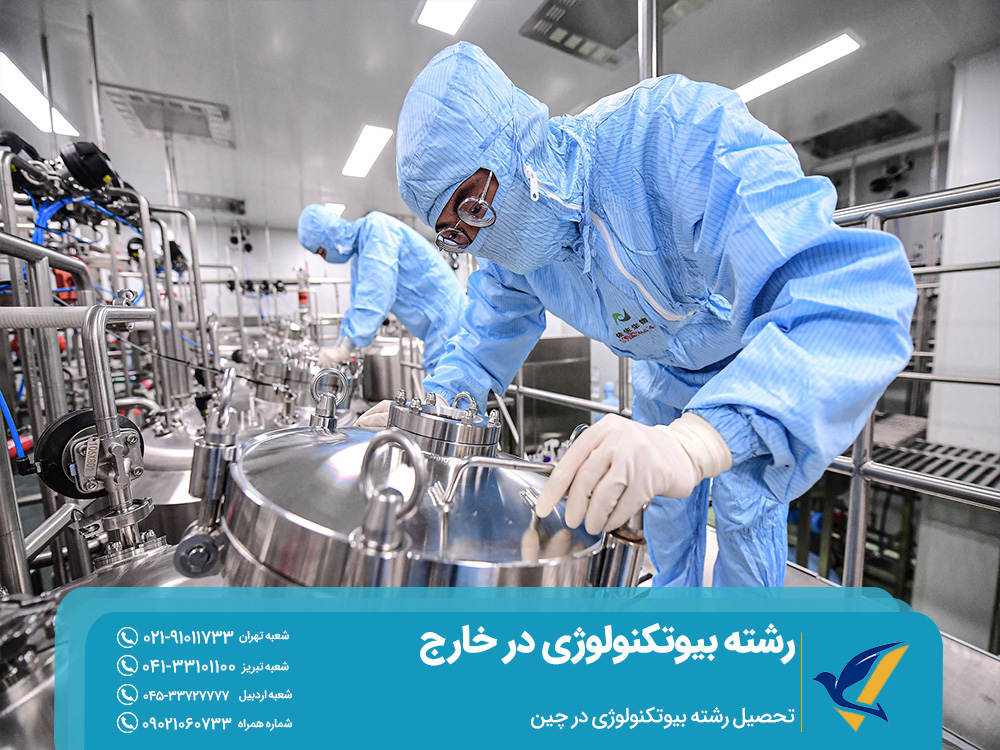Studying biotechnology abroad will open a window to discovering new scientific approaches. By pursuing this field, you will gain the necessary knowledge and skills in an advanced and highly applicable domain. Biotechnology is a combination of biological sciences and technology, to enhance biological products and processes. In many countries, biotechnology is recognized as one of the essential fields. Therefore, studying abroad will provide you with the opportunity to collaborate with leading scientists and work with cutting-edge global technology.
Harvard, Stanford, and MIT are considered the top biotechnology universities in the world. These institutions offer comprehensive and advanced programs in this field, preparing students for entry into the global job market. Biotechnology salaries abroad can be significant, depending on the country, specialization, and experience. This in-demand field offers diverse career opportunities for graduates in industries such as pharmaceuticals, agriculture, and scientific research. This article from the Elm Vira Science Series discusses the conditions for studying biotechnology abroad.
Introduction to Biotechnology
In recent years, biotechnology has become highly popular among students abroad, turning it into one of the most sought-after fields worldwide. The history of this field and the term “biotechnology” dates back to the 1960s. The first biotechnology company, Genentech, was established in 1976. This company commercialized technology using DNA technology. Since then, biotechnology has grown rapidly and currently holds a significant share of the job market.
Biotechnology is the science of using biology and effectively integrating it with technology. The goal of this scientific field is to apply biological sciences, engineering, and technology to solve environmental, medical, and industrial problems, as well as to enhance biological products and processes. Common examples of biotechnology include genetic modification and genetic engineering, where changes are made at the DNA level. Antibiotics, biofuels, genetically modified foods, and organ regeneration in the medical field are examples of biotechnology applications.
Biotechnology not only advances fields such as agriculture, food production, security, climate control, and medicine, but it can also help address some major environmental issues such as oil spills, pesticide side effects, and polluted water. Various techniques and technologies are used in industrial biotechnology or controlled bio-genetic processes. Biotechnology has a wide range of applications, including:
- Development of new drugs and vaccines
- Crossbreeding plants and animals to enhance desired traits
- Using bacteria in areas like food production and waste treatment
- Genetic modification and stem cell research

Studying Biotechnology Abroad
Biotechnology is one of the fields that has gained significant attention from students and holds a strong position in most countries worldwide. The diversity of specializations, broad applications, and numerous career opportunities are reasons why biotechnology is chosen by students. The importance of this field for countries and governments has also increased, as the impact of biotechnology can be seen in most advanced industries today.
Studying biotechnology abroad offers a unique opportunity for those interested in the field to acquire deep, specialized knowledge, access advanced research resources, and engage with extensive professional networks. A bachelor’s degree in biotechnology typically takes about 4 years to complete, while a master’s degree takes approximately 2 years, plus 2 years for an internship.
Choosing the right country and the best biotechnology universities worldwide will directly impact the quality of education, access to advanced facilities, and a more secure future career. Biotechnology is offered at all three academic levels abroad, with the doctoral program attracting more students and being more popular. The advantages of studying biotechnology abroad include:
- Gaining new knowledge and skills
- Improving career prospects
- Becoming familiar with different cultures
- Developing language skills
- Boosting self-confidence
Conditions for Studying Biotechnology Abroad
The conditions for admission and studying biotechnology depend on the destination country and university. Each country has its specific requirements, which may be more or less strict in certain cases. To learn about the admission process and requirements for studying biotechnology abroad, you should visit the website of your chosen university. However, the general requirements for studying biotechnology are as follows:
- High school diploma or an acceptable equivalent
- Good grades in mathematics, biology, chemistry, and physics
- English language proficiency certificate
- Statement of purpose
- Recommendation letters
- Acceptable scores on English proficiency exams
- A bachelor’s degree in biotechnology for master’s level studies
- Passing an entrance exam
- Proof of financial capability
If you intend to study biotechnology abroad, it is advisable to apply for admission to your desired universities several months before the start of the academic term. Having a strong academic record and high grades in subjects like chemistry and mathematics will support your admission. Your previous academic field, whether high school for undergraduate studies or a bachelor’s degree for postgraduate studies, should be related. Students from the experimental sciences track in high school or those with a biology degree can apply for biotechnology at both the undergraduate and master’s levels.

Specializations in Biotechnology
Biotechnology is an interdisciplinary field that combines biology, chemistry, physics, and information technology. It is offered at various academic levels and in universities worldwide, with diverse specializations for international students. Popular biotechnology degrees abroad include BSc, MSc, BE/BTech, MTech, and PhD. The most important specializations in this field are outlined below:
- Medical and Pharmaceutical Biotechnology: Utilizing biotechnological processes for the research and development of new drugs, as well as designing and developing diagnostic techniques and tools for various diseases.
- Bioinformatics: Applying computational methods and information technology to analyze biological data and simulate biological processes.
- Nanobiotechnology: Using nanotechnology to develop new biological materials and tools.
- Biophysics: Studying and analyzing the physical and mechanical processes of biological phenomena.
- Biochemistry: Examining the function and structure of biological molecules and their impact on biological systems.
- Agricultural Biotechnology: Genetic modification of plants and the improvement of livestock breeds to increase crop yields and animal production.
- Environmental Biotechnology: Using biotechnological methods to clean up environmental pollution and develop biotechnological approaches for waste management and recycling.
- Industrial Biotechnology: Applying biotechnology in industrial processes to produce various products.
- Molecular Biology: Studying the structure and function of molecules at the cellular and molecular level.
- Genetic Engineering: Using genetic techniques to improve the structure and function of pollutants and biological configurations.
- Marine Biotechnology: Utilizing marine resources for environmental research related to marine ecosystems.
- Food Biotechnology: Using microorganisms and enzymes in the processing and preservation of food to enhance food safety and quality.
- Tissue Engineering and Regenerative Medicine: Developing artificial tissues and using stem cells and advanced methods for repairing damaged tissues.
- Biochemical Engineering: Utilizing biochemical technologies in industrial processes and the production of biological products.

Best Countries for Studying Biotechnology Abroad
It is not possible to designate a single country as the best destination for studying biotechnology abroad, as the quality of education varies across countries. The best country for studying biotechnology depends on various factors such as university tuition fees, living costs, the location of the university, and the university’s ranking.
Top universities for biotechnology are located in countries like the United States and Canada. These universities are equipped with the latest facilities and laboratories. The United Kingdom, France, Switzerland, and Germany also have prestigious universities with modern laboratories, making them popular destinations for studying biotechnology. Australian universities are frequently chosen by students for undergraduate, master’s, and even PhD studies in biotechnology.
Countries like China, Turkey, Russia, and Japan offer lower tuition fees and living costs compared to Western countries. However, the quality of education in these countries is on par with European and American standards, while being more affordable.
Top Biotechnology Universities Worldwide
Biotechnology is offered in nearly all prestigious universities around the world, making the selection of a university and destination country easier for international students. Depending on their interests, budget, and preferred specialization, students can choose from a wide range of universities.
Studying biotechnology at globally recognized universities offers numerous advantages, including high-quality education, advanced laboratory and living facilities, and extensive networks with institutions and prominent individuals. These factors help students gain valuable experience and skills, opening up excellent job opportunities after graduation. Some of the best biotechnology universities in the world are:
UniversityCountryGlobal Ranking in Biotechnology
Harvard University USA 1
Massachusetts Institute of Technology (MIT) USA 2
Stanford University USA 3
University of Oxford UK 4
University of Cambridge UK 5
ETH Zurich Switzerland 6
University College London (UCL) UK 6=
Imperial College London UK 8=
Yale University USA 8=
The University of California USA 10
Additionally, there are high-level educational institutions in other European and Asian countries for studying biotechnology. Universities such as the University of Tokyo, National University of Singapore, Hacettepe University, Peking University, and St. Petersburg University offer top-tier education, advanced facilities, and affordable tuition fees.

Studying Biotechnology in China
China is one of the best options for studying biotechnology abroad. The universities in China have high academic standards and excellent rankings among global universities. Moreover, China has a very large and powerful industry in biotechnology and life sciences, and it plays a significant role in meeting the pharmaceutical needs of the population, including the production of medicines, vaccines, and serums. Therefore, the job market is strong, with many career opportunities for biotechnology graduates.
General Admission Requirements for Chinese Universities:
- Translated high school diploma in Mandarin Chinese
- Hanyu Shuiping Kaoshi (HSK) certificate with a score of 180 or higher, and IELTS/TOEFL results
- Bank statement
- Application essays
- CV (Curriculum Vitae)
- Letters of recommendation
- For English-taught programs: TOEFL or IELTS scores
- Proof of financial support: $3,500 per year
Affordable Tuition and Living Costs:
The cost of studying biotechnology in China is relatively affordable, with fees depending on factors such as the type of university, degree level, and language of instruction. The cost of studying biotechnology at the undergraduate level in Chinese universities is approximately ¥30,000 (CNY), which is equivalent to about $4,611 (USD) per year.
Top Biotechnology Universities in China:
- Peking University
- Wuhan University
- Sun Yat-sen University
- Huazhong University of Science and Technology
- Lanzhou University
- Fudan University
- Shanghai Jiao Tong University
- Nankai University
- Sichuan University
- Shandong University
These universities offer strong programs in biotechnology, providing students with advanced education and research opportunities in this rapidly developing field.

Biotechnology in Turkey
Biotechnology is an important and strategic field in Turkey, offered by a select number of universities. Turkish universities are academically well-regarded and meet international standards. To study at public universities in Turkey, international students need to pass the YÖS exam and meet the required scores. However, studying at private universities is possible without the need for the YÖS or other entrance exams for international students.
Biotechnology is taught in both English and Turkish. Students must submit the relevant language proficiency certificate for their chosen language. The job market for biotechnology graduates in Turkey is thriving and continuously developing. Some of the best universities for biotechnology in Turkey include:
- Ankara University
- Istanbul Technical University
- Gazi University
- Dokuz Eylul University
- Ataturk University
- Koc University
- Istanbul University
- Sabancı University
Biotechnology in Russia
Russia, with its leading universities and strong educational and research programs, is an ideal destination for those interested in studying biotechnology abroad. Russian universities provide advanced facilities, international collaborations, and a dynamic environment to prepare students for the global job market. Iranian students can easily obtain a student visa and study at an affordable cost. Tuition fees depend on the university, program level, and language of instruction.
The cost of living in major Russian cities is typically between $300 and $600 per month. To reduce costs, students can apply for scholarships and financial aid offered by the country. Biotechnology programs are offered in both Russian and English, with tuition in Russian being more affordable. To study in Russian, students are required to complete a preparatory Russian language course or a padfak (foundation course). Some of the top universities for biotechnology in Russia include:
- Lomonosov Moscow State University
- Saint Petersburg State University
- Novosibirsk State University
- Moscow Institute of Physics and Technology
- Kazan Federal University
- Tomsk University
- Sechenov University Moscow
Russia has made significant advances in biotechnology, with powerful industries in this field. This allows students to gain practical skills and prepares them for entry into the global job market in biotechnology.

Tuition and Scholarships for Biotechnology Abroad
The tuition fees for biotechnology programs abroad vary depending on factors such as the destination country, university, level of study, and language of instruction. Generally, the cost of studying biotechnology abroad is higher than studying in Iran. Top biotechnology universities in the US and Europe have high tuition fees due to the quality of education and resources they provide to students. However, it’s important to note that most universities and governments offer scholarships and financial aid to international students, especially those who show exceptional academic potential.
The cost of living and studying in universities in Asia and Australia is generally lower compared to European and US universities. However, a student’s choice of university will depend on their financial capability. For a master’s degree in biotechnology, tuition fees in the United States range from $35,410 to $87,950. In the UK, students must pay between £23,000 and £43,000. In Canada, biotechnology tuition fees range from $30,000 to $57,000. In Russia, the tuition fees for a bachelor’s degree in biotechnology are around $4,000 to $6,000 per year.
Job Market for Biotechnology
Biotechnology is a high-demand field with abundant job opportunities worldwide. Graduates in this field can secure top positions in their area of interest. After completing their studies, students can work in sectors such as education, agriculture, pharmaceuticals, food technology, biotechnology, and medical research institutions.
The rapid growth of biotechnology has allowed graduates to expand their careers in a wide range of fields, such as chemical industries, environmental science, genetic research, and regenerative medicine, as well as process control or research and development.
Some of the top job roles in biotechnology abroad include:
- Researcher
- Microbiologist
- Biomedical Engineer
- Biochemist
- Bioengineer
- Biotechnological Engineer
- Biochemist or Biophysicist
- Medical Laboratory Technician
- Epidemiologist
- Microbiologist
- Research Scientist
- Animal Scientist
- Agricultural Engineer
- Soil and Plant Scientist

Income in Biotechnology Abroad
The wide application of biotechnology in various industries has made this field highly lucrative with a strong job market. The income of biotechnology graduates abroad depends on factors such as education, job position, work experience, skills, and location. In the United States, senior managers and experts in the field can earn over $200,000 per year, while entry-level positions typically offer around $70,000 per year.
In Europe and Asia, the highest salaries for biologists can exceed $150,000 annually, with biotechnology professionals in Australia earning even more. Overall, biotechnology is considered a high-income career with excellent job prospects.
Conclusion
Biotechnology abroad is an attractive option for those interested in biological sciences and technology due to the advanced facilities, top universities, and numerous job opportunities available. By studying biotechnology, students have the chance to participate in innovative research and expand the boundaries of science and technology.
The best biotechnology universities in the world are in the United States and the United Kingdom; however, many universities in Europe and Asia also offer this program at the highest educational level, equipped with advanced facilities for international students. The benefits of studying biotechnology in countries like China, Russia, and Turkey include top academic institutions, advanced equipment, extensive international connections, and affordable tuition fees.
With the growing demand for biotechnology specialists across various industries, there are abundant career opportunities for graduates. Additionally, biotechnology branches are applicable in most sectors. The income in biotechnology abroad varies based on education level, workplace, experience, and skills. Overall, experienced biologists earn high salaries. If you’re interested in studying biotechnology abroad but haven’t chosen a country or university yet, you can seek assistance from our consultants at Elm Vira Immigration Institute. Visit our free consultation section for more information on studying abroad.
میانگین امتیازات 5 از 5
Vote count: 1 Vote